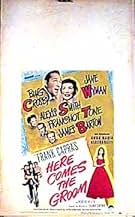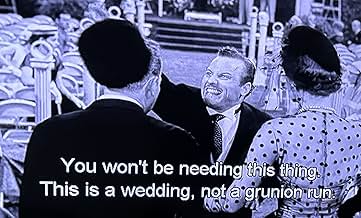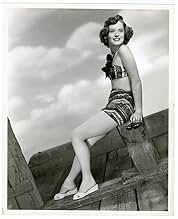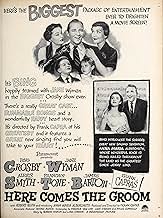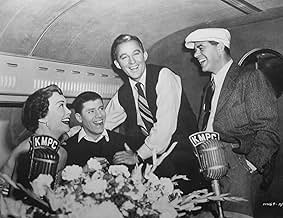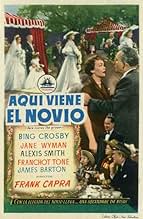CALIFICACIÓN DE IMDb
6.3/10
1.3 k
TU CALIFICACIÓN
Agrega una trama en tu idiomaForeign correspondent Pete Garvey has 5 days to win back his former fiancée, or he'll lose the orphans he adopted.Foreign correspondent Pete Garvey has 5 days to win back his former fiancée, or he'll lose the orphans he adopted.Foreign correspondent Pete Garvey has 5 days to win back his former fiancée, or he'll lose the orphans he adopted.
- Dirección
- Guionistas
- Elenco
- Ganó 1 premio Óscar
- 3 premios ganados y 5 nominaciones en total
Jacques Gencel
- Bobby
- (as Jacky Gencel)
Opiniones destacadas
Another Bing Crosby vehicle and another job for Frank Capra at Paramount, his last, Here Comes the Groom is a light and frilly affair that takes too long to do too little but is intermittently charming along the way. It's a largely unremarkable film that doesn't try to make a whole lot of sense, especially in its ending, but at least Crosby and Jane Wyman work well together.
Pete Garvey (Crosby) is a war correspondent still in Paris several years after the end of WWII, latching onto an orphanage of war orphans about whom he is writing a series of stories about in order to get them adopted and sending them back to his editor George (Robert Keith) who is getting tired of them since the world has moved on. He also has a girl back home, Emmadel (Wyman), who has grown sick of waiting for her beau to return and sends him a record of her voice telling him that she's leaving him. It's really the only fun bit of filmmaking in the whole thing since Capra has her superimposed on top of the record to speak the lines and even ends with a fun bit of nonsense around the mechanics of the player itself.
Well, Pete gets the bug to go back home, but not before he disappears for two months to find the birth certificates of his two favorite orphans Bobby (Jacques Gencel) and Suzi (Beverly Washburn). I think this is supposed to establish Pete as forgetful but dedicated, and yet the rest of the film is him laser focused on getting what he needs without wavering. It's almost like the script by Virginia Van Upp, Liem O'Brien, and Myles Connolly was kind of just slap-dashed together, or something.
Anyway, the only real reason to see this film is Crosby himself. He's a charming lead and much more in line with the tenor of the overall picture here than he had been in Riding High. Here, he's a lovable heel who needs to find a way to get back home, convince the woman he loves that she still loves him, and undermine her quickly scheduled marriage to Wilbur Stanley (Franchot Tone), the latest in the line of a wealthy and powerful Bostonian family. The competition that develops between Pete and Wilbur is friendly and leads to no real hard feelings on any front, even when Wilbur conspires to have the orphans adopted if and when Pete doesn't get married on time (a condition of the adoption since he's a bachelor). It's almost like none of the characters consider there to be anything like stakes around the place.
Well, the bulk of the film is Crosby charming his way back into Emmadel's heart (the first rendition of the Oscar winning song "In the Cool, Cool, Cool of the Evening" is a delightful narrative treat since it shows the two still having a connection that develops over the song), spruce up Wilbur's cousin (fourth-cousin once removed) Winifred (Alexis Smith) so that she can become attractive to Wilbur instead, all while George hangs around for little reason other than to give some funny quips now and then. The finale is the big, to do wedding with many important guests and some bit of farce to get Pete on the altar instead of Wilbur that everyone just accepts because the feelings of the orphans are important and this very real ceremony isn't real, or something. It makes just this side of no sense, made all the weirder by Wilbur's reaction to it all which is like he didn't care.
So, it's very slight. It has some real charm to it. It's loosely told and kind of nonsensical. It has a nice song that it overplays (I didn't need to hear "Evening" three times, but whatever, it's not like there's a whole lot else). It's primarily a vehicle to showcase Bing Crosby's charm, and it does that reasonably well.
I think it would have worked better at 90 minutes instead of 110, though.
Pete Garvey (Crosby) is a war correspondent still in Paris several years after the end of WWII, latching onto an orphanage of war orphans about whom he is writing a series of stories about in order to get them adopted and sending them back to his editor George (Robert Keith) who is getting tired of them since the world has moved on. He also has a girl back home, Emmadel (Wyman), who has grown sick of waiting for her beau to return and sends him a record of her voice telling him that she's leaving him. It's really the only fun bit of filmmaking in the whole thing since Capra has her superimposed on top of the record to speak the lines and even ends with a fun bit of nonsense around the mechanics of the player itself.
Well, Pete gets the bug to go back home, but not before he disappears for two months to find the birth certificates of his two favorite orphans Bobby (Jacques Gencel) and Suzi (Beverly Washburn). I think this is supposed to establish Pete as forgetful but dedicated, and yet the rest of the film is him laser focused on getting what he needs without wavering. It's almost like the script by Virginia Van Upp, Liem O'Brien, and Myles Connolly was kind of just slap-dashed together, or something.
Anyway, the only real reason to see this film is Crosby himself. He's a charming lead and much more in line with the tenor of the overall picture here than he had been in Riding High. Here, he's a lovable heel who needs to find a way to get back home, convince the woman he loves that she still loves him, and undermine her quickly scheduled marriage to Wilbur Stanley (Franchot Tone), the latest in the line of a wealthy and powerful Bostonian family. The competition that develops between Pete and Wilbur is friendly and leads to no real hard feelings on any front, even when Wilbur conspires to have the orphans adopted if and when Pete doesn't get married on time (a condition of the adoption since he's a bachelor). It's almost like none of the characters consider there to be anything like stakes around the place.
Well, the bulk of the film is Crosby charming his way back into Emmadel's heart (the first rendition of the Oscar winning song "In the Cool, Cool, Cool of the Evening" is a delightful narrative treat since it shows the two still having a connection that develops over the song), spruce up Wilbur's cousin (fourth-cousin once removed) Winifred (Alexis Smith) so that she can become attractive to Wilbur instead, all while George hangs around for little reason other than to give some funny quips now and then. The finale is the big, to do wedding with many important guests and some bit of farce to get Pete on the altar instead of Wilbur that everyone just accepts because the feelings of the orphans are important and this very real ceremony isn't real, or something. It makes just this side of no sense, made all the weirder by Wilbur's reaction to it all which is like he didn't care.
So, it's very slight. It has some real charm to it. It's loosely told and kind of nonsensical. It has a nice song that it overplays (I didn't need to hear "Evening" three times, but whatever, it's not like there's a whole lot else). It's primarily a vehicle to showcase Bing Crosby's charm, and it does that reasonably well.
I think it would have worked better at 90 minutes instead of 110, though.
"Here Comes the Groom" is the sort of schmaltzy fluff that Bing Crosby did best. While I am quick to admit that this is a very slight film, it is also a very, very enjoyable film. Deep? Nah--but fun.
The film begins with Bing hanging out with a bunch of cute orphans in post-war France. He's supposed to be coming back to the USA to marry his fiancée (Jane Wyman) but he cannot leave the kids in a lurch--particularly two cute kids who he plans to adopt. The only trouble is that after he's done all the paperwork to bring them to America, he's returned so late that his girlfriend has called off the wedding and is now planning to marry her boss (Franchot Tone). You really can't blame her too much--Bing never told her he'd be late or why he'd be late. In other words, she wasn't feeling very appreciated.
There is a problem with Bing not getting married, however. In order to adopt the kids and keep them he MUST get married...and quick. Bing isn't about to try to find another girl and he really does care about Jane, so he's determined to break up the engagement and marry her himself. Here is where it gets interesting--Bing tells Franchot and Franchot actually allows him a chance to win her back. After all, if she isn't 100% ready to marry him, why not let her marry Bing? Where all this ends is very predictable--but a film like this always is. Along the way, you have some nice comedy (particularly the portions with Alexis Smith) and really nice songs--and it's quite enjoyable and cute. Perhaps it's too cute and saccharine for some--I could understand that. But, if you don't mind and are looking for an old fashioned family film, it's well worth your time.
The film begins with Bing hanging out with a bunch of cute orphans in post-war France. He's supposed to be coming back to the USA to marry his fiancée (Jane Wyman) but he cannot leave the kids in a lurch--particularly two cute kids who he plans to adopt. The only trouble is that after he's done all the paperwork to bring them to America, he's returned so late that his girlfriend has called off the wedding and is now planning to marry her boss (Franchot Tone). You really can't blame her too much--Bing never told her he'd be late or why he'd be late. In other words, she wasn't feeling very appreciated.
There is a problem with Bing not getting married, however. In order to adopt the kids and keep them he MUST get married...and quick. Bing isn't about to try to find another girl and he really does care about Jane, so he's determined to break up the engagement and marry her himself. Here is where it gets interesting--Bing tells Franchot and Franchot actually allows him a chance to win her back. After all, if she isn't 100% ready to marry him, why not let her marry Bing? Where all this ends is very predictable--but a film like this always is. Along the way, you have some nice comedy (particularly the portions with Alexis Smith) and really nice songs--and it's quite enjoyable and cute. Perhaps it's too cute and saccharine for some--I could understand that. But, if you don't mind and are looking for an old fashioned family film, it's well worth your time.
A new and improved Jane Wyman appears in this picture with Bing Crosby. She is no longer the violated waif we saw in Johnny Belinda, but a self-confident woman who knows how to sing and clown around. Check out the moment where she visits Mr. Crosby in the guest house and proceeds to fall flat on her face in that larger-than-life dress! And she's sweet in the scenes with the kids, too.
But in case we forget that she's also a serious dramatic actress, there are moments of toughness between her and costar Alexis Smith. The film is a treat for any Wyman fan who enjoys watching the actress prove her versatility time and again, not that she ever had to. We have known about her talent for quite some time now.
But in case we forget that she's also a serious dramatic actress, there are moments of toughness between her and costar Alexis Smith. The film is a treat for any Wyman fan who enjoys watching the actress prove her versatility time and again, not that she ever had to. We have known about her talent for quite some time now.
When the best thing about a BING CROSBY/JANE WYMAN film is a song called "In the Cool, Cool, Cool of the Evening", you know you're in trouble. What is supposed to be harmless fluff is pretty empty fluff at that. And why anyone is surprised that Jane Wyman can carry a tune with the best of them, mystifies me. Miss Wyman made her debut playing dizzy chorus girls who usually tossed off a song and dance number before the first reel was over, in a number of films, mainly at Warner Bros. And later on, after she became a big star, she still contributed nicely to the Cole Porter bio, NIGHT AND DAY.
Anyway, here she has one of her brisk, no nonsense roles as a gal who's tired of waiting around for her globe trotting boyfriend (Crosby) to take her down the aisle, so she's engaged to FRANCHOT TONE. But Crosby manages to use all of his wiles to coax her back, even if it includes some shenanigans involving ALEXIS SMITH (of all people), who gives one of her best comedic roles all the spirit it deserves.
But when all is said and done, HERE COMES THE GROOM seems sub-standard and a bit foolish, unworthy of talents like Crosby and Wyman. Their best moment comes when they croon the title tune while choreographed waltzing around a huge office, but it's not enough to keep the rest of the story from floundering amid too many missed opportunities.
Summing up: Capra running on empty can be tiresome.
Anyway, here she has one of her brisk, no nonsense roles as a gal who's tired of waiting around for her globe trotting boyfriend (Crosby) to take her down the aisle, so she's engaged to FRANCHOT TONE. But Crosby manages to use all of his wiles to coax her back, even if it includes some shenanigans involving ALEXIS SMITH (of all people), who gives one of her best comedic roles all the spirit it deserves.
But when all is said and done, HERE COMES THE GROOM seems sub-standard and a bit foolish, unworthy of talents like Crosby and Wyman. Their best moment comes when they croon the title tune while choreographed waltzing around a huge office, but it's not enough to keep the rest of the story from floundering amid too many missed opportunities.
Summing up: Capra running on empty can be tiresome.
It's a lightweight comedy, but this film has unforgettable moments. Plotwise, it's postwar Capra claptrap complete with French orphans-- but also some dazzling camera work and a few did-I-just-see-that? Surrealistic touches.
The first is a hologram of sorts: Bing's in France listening to an audio letter from fiancée, Jane Wyman-- a Dear John recordio-gram. As it's playing, Wyman materializes on the spinning record, Princess Leia-like. So I should have been prepared for anything, but when Der Bingle is on the plane back to America, he (of course) starts singing to the orphans. The tune is "Misto Cristofo Columbo"-- and suddenly Louis Armstrong walks into the airline cabin, complete with trumpet and hankie-- then up pops the bottom of the Hollywood barrel: Dorothy Lamour, Frank Fontaine and Phil Harris, all singing.
When the plane, and the plot, land in Boston, Bing has to win Jane back from Franchot Tone, which he does via a Pygmalion subplot involving Alexis Smith and men's pajamas. Hubba hubba. Best of all though is one of film's great tracking shots (nothing compared to "I Am Cuba," but still), a song-and-dance number through an office building to "In the cool cool cool of the evening." If only they'd brought Satchmo back for the big double-wedding ending.
The first is a hologram of sorts: Bing's in France listening to an audio letter from fiancée, Jane Wyman-- a Dear John recordio-gram. As it's playing, Wyman materializes on the spinning record, Princess Leia-like. So I should have been prepared for anything, but when Der Bingle is on the plane back to America, he (of course) starts singing to the orphans. The tune is "Misto Cristofo Columbo"-- and suddenly Louis Armstrong walks into the airline cabin, complete with trumpet and hankie-- then up pops the bottom of the Hollywood barrel: Dorothy Lamour, Frank Fontaine and Phil Harris, all singing.
When the plane, and the plot, land in Boston, Bing has to win Jane back from Franchot Tone, which he does via a Pygmalion subplot involving Alexis Smith and men's pajamas. Hubba hubba. Best of all though is one of film's great tracking shots (nothing compared to "I Am Cuba," but still), a song-and-dance number through an office building to "In the cool cool cool of the evening." If only they'd brought Satchmo back for the big double-wedding ending.
¿Sabías que…?
- Trivia"In the Cool, Cool, Cool of the Evening" was the fourth song performed by Bing Crosby in a film that went on to win the Academy Award for Best Song.
- ErroresWhen Winifred seeks shelter in Garvey's home, George is on the phone. In a close-up, the phone is to his ear, but in the next medium shot, the phone is hung up, and he picks up the receiver again.
- Citas
Husband on Airplane: [Complaining about fellow passenger Bing Crosby's singing on plane] Oh... There they go again ! Don't these actors ever stop making noises?
Wife on Airplane: They're USO people. They sing for soldiers.
Husband on Airplane: Soldiers can shoot back. They've got guns.
- ConexionesFeatured in Paramount Presents (1974)
- Bandas sonorasMisto Cristofo Columbo
Written by Ray Evans and Jay Livingston
Performed by Bing Crosby, Dorothy Lamour, Louis Armstrong, Cass Daley,
Phil Harris, Frank Fontaine
Selecciones populares
Inicia sesión para calificar y agrega a la lista de videos para obtener recomendaciones personalizadas
- How long is Here Comes the Groom?Con tecnología de Alexa
Detalles
- Fecha de lanzamiento
- País de origen
- Idiomas
- También se conoce como
- Here Comes the Groom
- Locaciones de filmación
- Productora
- Ver más créditos de la compañía en IMDbPro
Taquilla
- Presupuesto
- USD 2,117,000 (estimado)
- Tiempo de ejecución1 hora 53 minutos
- Color
- Relación de aspecto
- 1.37 : 1
Contribuir a esta página
Sugiere una edición o agrega el contenido que falta

Principales brechas de datos
By what name was Aquí viene el novio (1951) officially released in India in English?
Responda

